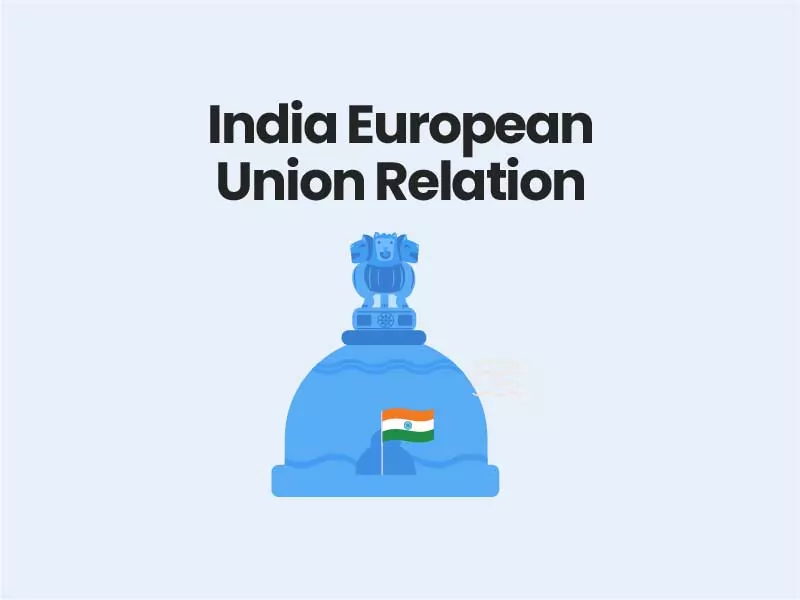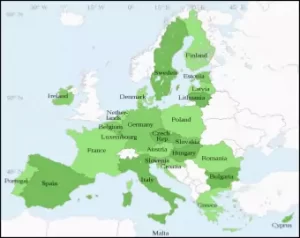
India European Union (EU) Relation
The relationship between India and the European Union (EU) are based on shared values and principles such as democracy, rule of law, rules based international order and multilateralism.
The ties are multifaceted and cover a broad spectrum of topics including trade, investment, climate change, science and technology, artificial intelligence, connectivity, agriculture and marine.
India-EU Relations – Background
India-EU bilateral relations date back to the early 1960s with India being amongst the first countries to establish diplomatic relations with the European Economic Community in 1962
The Joint Political Statement signed in 1993 coupled with a Cooperation Agreement signed in 1994 opened the way for strengthening the bilateral ties
A multi-tiered institutional architecture of cooperation has since been created, presided over by the India-EU Summit since 2000.
The relationship was upgraded to a ‘Strategic Partnership’ in 2004.
They adopted a Joint Action Plan in 2005 that provided for strengthening dialogue and consultation mechanisms in the political and economic spheres, enhancing trade and investment, and bringing peoples and cultures together.

Areas of Cooperation
- EU and India remain close partners in the G20 and have developed a regular macroeconomic dialogue to exchange experience on economic policies and structural reforms.
- Trade & Investment – EU is India’s 3rd largest trading partner in 2020, next only to China and US.
- EU is India’s largest source of FDI.
- India and EU have also established an Investment Facilitation Mechanism (IFM) in 2017 under which Invest India has created a single window entry point for EU companies.
- Development Cooperation – Over €150 million worth of projects by EU are currently ongoing in India..
- European Investment Bank (EIB) is providing loans for Lucknow, Bangalore, and Pune Metro Projects.
- India-EU Partnership for Smart and Sustainable Urbanization will support the Indian ‘Smart cities’ and ‘AMRUT’ initiatives to boost joint research and innovation.
- Defence & Security – EU and India have instituted several mechanisms for greater cooperation on pressing security challenges like counterterrorism, maritime security, and nuclear non-proliferation.
- Information Fusion Centre – Indian Ocean Region in New Delhi (IFC-IOR) has recently been linked-up with the Maritime Security Centre – Horn of Africa (MSC-HOA) established by the EU Naval Force (NAVFOR).
- ICT Cooperation – EU and India aims to link the ‘Digital Single Market’ with the ‘Digital India’ programme.
- A new “Start-up Europe India Network” initiative was launched in 2016.
- An EU-India Cyber Security Dialogue has been set up that focusses on exchange of best practice on addressing cybercrime and strengthening cyber security and resilience.
- Environment & Water – EU and India also underline their highest political commitment to the effective implementation of the Paris Agreement and the UNFCCC despite US withdrawing from the same .
- India-EU Clean Energy and Climate Partnership was agreed at the 2016 Summit – to promote access to and disseminate clean energy and climate friendly technologies and encourage R&D.
- Energy cooperation is now ongoing on a broad range of energy issues, like smart grids, energy efficiency, offshore wind and solar infrastructure, and research and innovation.
- EU and India also cooperate closely on the Indian Clean Ganga initiative and deal with other water-related challenges in coordinated manner.
- Science & Research – India-EU Science & Technology Steering Committee meets annually to review scientific cooperation.
- India and European Atomic Energy Community (Euratom) signed a cooperation agreement in the field of fusion energy research in 2009.
- Both have official mechanisms in fields such as Digital Communications, 5G technology, Biotechnology, artificial intelligence etc.
- Space Cooperation – ISRO has a long-standing cooperation with the European Union, since 1970s.
- In 2018, the ISRO and the European Space Agency (ESA) have signed an agreement on sharing data from the satellites (Copernicus Programme).
- People to People relations – India and the EU organize Festivals of culture (e.g., Europalia-India festival), exchanges on heritage such as yoga & Ayurveda etc.
- Over 50,000 Indian students currently studying in various European Universities.
- Migration and mobility – The EU-India Common Agenda on Migration and Mobility (CAMM) is a fundamental cooperation agreement between India and EU .
- This agreement aims at a better organized regular migration and the fostering of well-managed mobility
After the promising beginnings in 2000s, the EU-India partnership lost its momentum as it largely focused on trade and cultural matters, rather than broad strategic and political issues. Europe’s main focus earlier was on China as its key partner and market in Asia.
Challenges in Relations
- India-EU BTIA – The negotiations for a Broad-based Bilateral Trade and Investment Agreement (BTIA) were held between 2007 to 2013 but have remained dormant/suspended since then.
- India demands for ‘Data secure’ status (important for India’s IT sector) (relate with GDPR), to ease norms on temporary movement of skilled workers, relaxation of Sanitary and Phytosanitary (SPS), etc
- EU demands for significant duty cuts in automobiles, tax reduction on wines, spirits etc, a strong intellectual property regime, relaxation in India’s data localisation norms, etc.
- Trade imbalance – India accounts for only 1.9% of EU total trade in goods in 2019, well behind China (13.8%).
- Post Brexit situation – In the longer term of balancing of global powers, a smaller Europe without the key military and economic force UK, can be a weaker Europe in the face of an ambitious China and an increasingly protectionist US.
- India viewing EU primarily as a trade bloc – this has resulted in a lack of substantive agreements on matters such as regional security and connectivity..
- Human Rights concerns of EU – The European Parliament was critical of both the Indian government’s decision to scrap Jammu and Kashmir’s special status in 2019 and the Citizenship (Amendment) Act.
In the present complex international environment, India and the European Union, both “unions of diversity”, sharing values of democracy, rule of law and human rights, are equally convinced of the necessity to preserve the rules-based international order and effective multilateralism.
India and the EU have a common interest in each other’s security, prosperity, and sustainable development. With a stronger cooperation, they can contribute jointly to a safer, cleaner, and more stable world.
Need for Strengthening India-EU Relations/Opportunities under changing Geopolitical Developments
- Chinese Challenge – China’s increasing presence in Eurasia and South Asia is creating similar security, political and economic concerns for Europe and India.
- Both are driven by the need to diversify its partnerships and balance.
- Fall of the conventional Liberal Trade Order – Trade war, crumbling WTO and break down of TPP etc. has made EU understand the economic importance of India.
- BREXIT – Brexit is pushing India to look for new ‘gateways’ to Europe, as its traditional partner leaves the union. A renewed trade and political cooperation are the need of the hour.
- Convergence of interests in the Indian Ocean – as the Indian Ocean is the main conduit for global trade and energy flows.
- India and EU see each other as partners in securing the Indian Ocean by strengthening institutions, rule of law, and a regional security architecture.
- Global Leadership vacuum – Retreat of the U.S. from global leadership has provided opportunities for EU- India cooperation and trilateral dialogues with countries in the Middle Fast, Central Asia, and Africa.
- Strategic rivalry between the US and China – Both EU and India have a common interest in avoiding a bipolarized world and sustaining a rules-based multilateral trading system with the United Nations and the World Trade Organization at its core.
- Green governance – After the US exit from the Paris climate agreement, India and the EU stand to gain from a joint leadership on global governance matters such as climate change, clean energy, or circular economy.
- New emerging world order after COVID-19 – As EU seeks to move away from a global supply chain that is overly dependent on China, India can emerge as its most natural ally.
in 2018, the EU released a new strategy for cooperation with India, calling it a geopolitical pillar in a multipolar Asia, crucial for maintaining the balance of power in the region. As highlighted in EU strategy on India, it sees EU-India relations in the context of broader geopolitical developments, primarily the rise of China. Impact of China in Europe and Asia (e.g., Belt and Road initiative) has pushed EU to change the nature of its partnerships in the region, particularly with India.
Recent Developments
- ‘India-EU Strategic Partnership: A Roadmap to 2025’ was adopted to guide cooperation between India and the EU over the next five years.
- Agreed to establish regular High-Level Dialogue to guide negotiations on Broad-based Trade and Investment Agreement (BTIA) and to address multilateral issues of mutual interest.
- Civil Nuclear Cooperation – Agreement between India-EURATOM (European Atomic Energy Community) on research and development cooperation in the peaceful uses of nuclear energy was signed.
- Adopted declarations on Resource Efficiency and Circular Economy, decided to launch a dialogue on maritime security, renewed Agreement on Scientific cooperation.
- Connectivity Partnership – India and the EU launched in the recent Virtual Summit, an ambitious “connectivity partnership” in digital, energy, transport, and people-to-people sectors, enabling the two to pursue sustainable joint projects in regions spanning from Africa, Central Asia to the wider Indo-Pacific.
The EU sees a larger role of India in the regional (Asian) and global security – economic architecture, and therefore is working on a new strategy with respect to India.
Way Forward
- As highlighted by EU strategy on India 2018, India EU should take their relations beyond “trade lens”, recognizing their important geopolitical, strategic convergences.
- Finalization of India-EU Free Trade Treaty as soon as possible, for closer convergence.
- Strengthening technical cooperation on fighting terrorism, countering radicalization, violent extremism, and terrorist financing.
- EU can collaborate with India to facilitate connectivity and infrastructure projects in third countries, particularly smaller states in South Asia that often fall prey to power politics and fiscal instability resulting from China’s loans and political influence as part of its BRI.
- Torchbearers of Democracy – To translate their common values into common action, EU and India in can work in third countries to consolidate democratic processes and build capacities of transitioning regimes through strengthening electoral and parliamentary institutions.
- Strengthening Climate partnership – In India’s efforts to increase the use of renewable energy in India, the investment and technology of Europe is of paramount importance.
A close bilateral relation between India and the EU has far-reaching economic, political, and strategic implications on the crisis-driven international order. Both sides should realise this potential and must further the growth of the bilateral ties with a strong political will.
Read Full GS 2 Notes
Enroll today with the best civils service academy and take your first step towards yours Civils out journey.
Feel free to reach to us for any inquiries, collaborations, or support. We’re here to help


